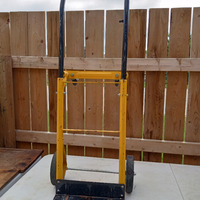A Steinbach firefighter has taken to social media to speak openly about mental health.
With 25 years with the Steinbach Fire Department and additional experience as a firefighter-paramedic in Winnipeg, Russ Reimer says the realities of the job go far beyond what most people imagine.
The weight of the uniform
When he first joined the fire service, Reimer thought it was all about the training, the fires, and the excitement portrayed in movies. Over time, he learned it was much more than that.
“I've learned that the heroism for a firefighter is not about the physical rescues, it's not about the big fires, it's actually how we're going to journey with each other, with each other's hearts. Actually caring about one another, having those harder conversations on how are you really doing, how are things at home with your wife, how's it going being a dad?”
He admits that balancing his role as a rescuer while caring for his own mental health has been difficult.
“If I'm honest, I haven't learned how to balance it. I'm completely broken, and that's probably why I'm so passionate,” Reimer says. “I picture a teeter totter... and I feel like it's snapped in half somewhere in the middle, and I'm on that one piece that's on the ground.”
He explains that understanding how his brain works through therapy has been a major step forward. He also leans on exercise, faith, and time outdoors to stay grounded, while remaining open with his family about the challenges.
Breaking old habits
For decades, Reimer says firefighting culture often turned to alcohol or other unhealthy ways of coping. He adds that this is changing and must continue to change.
“You need to learn all of the cognitive behavioural techniques. I'm not saying you can't drink, but you certainly shouldn't be drinking to try and get rid of something from a call, it's never going to work.
"It's a big rock in your pack and only these therapy roads with cognitive behavioural, spending time in nature, grounding, deep breathing, firefighter resilience, and having firefighters come along and mentor you in that vein, that's the only way you'll survive a career in firefighting.”
He stresses that young firefighters should find healthy strategies early on and surround themselves with supportive mentors.
“If these younger firefighters start having this conversation amongst each other, they will be surprised at how awesome that road is,” he says. “Be real with each other. Don't blow smoke, it's going to catch up with you.”
The challenge of access
Reimer says access to mental health support is one of the biggest challenges firefighters face globally.
“95 per cent of your firefighters in North America are paid on-call or volunteer fire departments. They don't have behavioural health units, and they won't ever have them.”
While some volunteer firefighters may have coverage through their full-time jobs, he says others must turn to private insurance. Even then, the average cost can be over $200 an hour.
“Firefighters who really need help will not say they need help because they're worried about the financial. If we can remove the financial barrier, it would be amazing how many more firefighters would take the help.”
Firefighters require a different kind of therapy than most people, as their therapists need to be specialized in trauma.
“Otherwise, we honestly will traumatize the therapist. We start sharing some of our stories, our stories are so bad that you, as a listener, sometimes you won't be able to handle it.”
Though it can be challenging, he encourages first responders to take the first step.
“This is not an easy undertaking to have a rescuer admit that they need rescuing, and I think it's going to take a lot of tearing those walls down and totally turn this over. Maybe 20 to 30 years from now, we see a totally different, healthy whole emergency services.”
Supporting the supporters
Reimer is passionate about securing resources not just for firefighters, but also for the spouses of first responders.
“My wife is my safe haven for the more detailed version of my day. So, imagine how she's doing, and I will tell you that one big plea I have for help in the mental health world is please help me figure out how to get the proper help for my wife.”
Friends and family play a vital role in a firefighter’s mental health, even though it can be difficult to know how to help. Reimer says the simplest approach is to reach out, admit you don’t always know what to say, but show that you care and hope they’re doing okay.
“My mental health number instantly went up. I feel a sigh. You see me, you understand as much as you can understand, you care, even if you can't help me. And you're there, and that's enough.”
Taking the message online
Recently, Reimer began sharing his story on Instagram. His posts have reached countless first responders, including some in crisis.
Some of those people say they have chosen to enter therapy, and others have chosen life over suicide after connecting with him online.
“I believe that when we die, the true legacy will be how we journeyed with other people's souls. It's all about relationships,” he says. “And so, Instagram has given me this platform to tell the whole world that I care about them.”
Reimer frequently connects with individuals in crisis or those who simply need someone to listen. He has launched a GoFundMe campaign to help support meeting with more people.
“My heart, it's totally turned into rescuing the rescuer. I didn't know that firefighting would turn into this for me, that it wouldn't be about the external physical building, but rather the internal broken firefighter, and so it's quite a new thing for me, and it's exploding.”
Why keep showing up
Firefighting is both mentally and physically exhausting, and Reimer admits there have been days he has thought about walking away, but his mission keeps him going.
“I feel so inclined to journey with my fellow firefighters and first responders,” he says, “The way I want to end this career now is I want to see the next 10 to 20 years change it over, and that the crews, while they're on duty, are chatting about their life.”
Whether it’s going to therapy or opening up to a coworker, Reimer has one message:
“Don't do life alone. Firefighters have a two-person model. You should never ever be doing life alone. And if you feel like you're alone, well then, contact me because then I'll know you and you'll no longer be alone.”
If you or someone you know is struggling, call or text 988 for mental health crisis support.






















